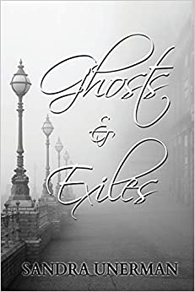 Ghosts & Mirrors, by Sandra Unerman
Ghosts & Mirrors, by Sandra Unerman
(Mirror World Publishing, 2018)
Sandra Underman’s second novel does nothing so crass as to reveal its intentions straight off. It turns out to be a sequel to her first novel, Spellhaven, but it reveals itself in layers.
It begins in a well-depicted 1930s upper class London, a neatly socially stratified society of emotional repression where the unhappier and lonelier your kids are at boarding school, the better you must be doing it. Not that anyone would think of it in such terms, which adds to the realism. A bachelor solicitor is the official guardian of a nephew he barely knows, at school in London, whose parents are in China and haven’t seen him in seven years. The boy, Hugo, is suffering terrible nightmares at school. The man seeks out the widowed mother of Hugo’s only school friend, Nicholas, to see if he can talk to the boy and get a handle on what is happening. This all happens in the opening chapter, and that alone, with its neat little dance between strangers of proprieties so well understood that no one bothers to state them out loud, sets the tone for everything to come.
Hugo in fact is being haunted by the marauding ghosts that patrol Hampstead Heath. He inadvertently conjured them up and now they won’t leave him alone. A solution of sorts is found. Then we meet the apparent villain of the piece, a thoroughly nasty piece of work who would not look out of place in John Masefield’s The Midnight Folk or The Box of Delights. (In fact there is a lot of Kay Harker in all three of the story’s very engaging boys – Hugo, Nicholas and his brother James. They are decent, likeable, vulnerable, bright, and never bother questioning the impossibility of what is happening to them.)
Then, finally, we get the Spellhaven angle, and it turns out to be Spellhaven underpinning the whole shebang.
Spellhaven was a city of wonder and magic, destroyed unexpectedly in one the first novel’s several twists. Survivors found themselves in our world in the middle of the First World War. Now it is the 1930s, so the children who escaped the destruction are the first generation to reach adulthood. Some intermarry, some – like Nicholas and James’s father – marry outside the Spellhaven circle. Their own children only know of Spellhaven through their grandparents’ stories.
Spellhaven was ruled by Lord Magicians who were firmly convinced they knew everything there was to know about magic. Spellhaven died, therefore magic died. There Is No More Magic. They really should have known better than to make their new home in the ancient, mystical land of England, then. That was their first mistake. The Hampstead ghosts are the first clue that they may be wrong about this, for those with eyes to see, who aren’t many. The interesting way that the villain traps victims is another. It also becomes clear to everyone except his own people that Nicholas is following his own magical path.
Their second mistake was to forget, or ignore, exactly how Spellhaven operated. It was a society of mostly decent people who had inherited a system of slavery and involuntary indentured servitude, both of humans and, crucially, of the spirits that gave the Lord Magicians their power. The Lords manage to overlook the fact that the spirits did not die with the city, and like most complacent rulers, it never crosses their minds that the beings they used to oppress do not remember their masters fondly.
The ending is happy in that the immediate needs of all the sympathetic characters are met. Whether or not these are helpful, healthy long-term solutions to deeper problems remains to be seen. In at least one case, almost certainly not. So maybe we will get a third novel, as different to this as this is to the first.
